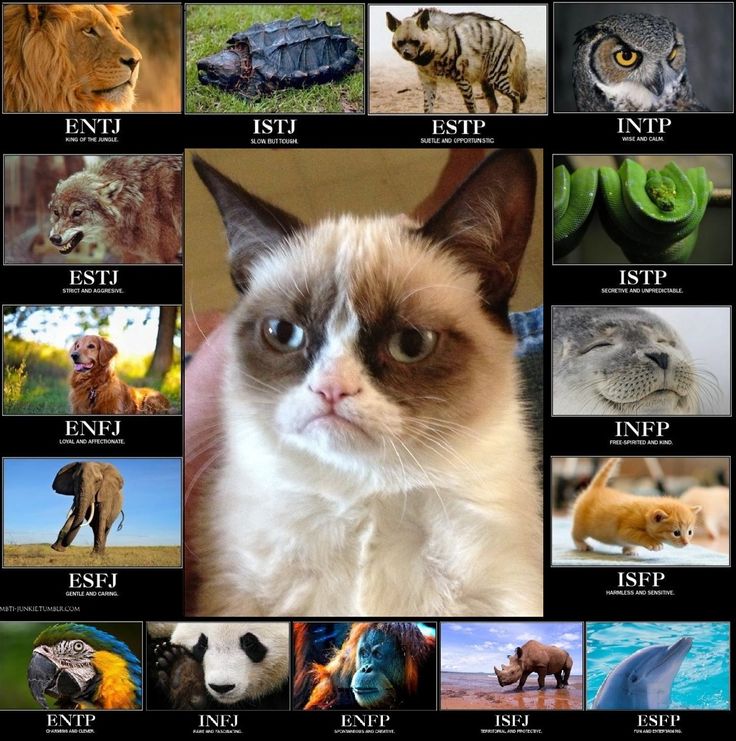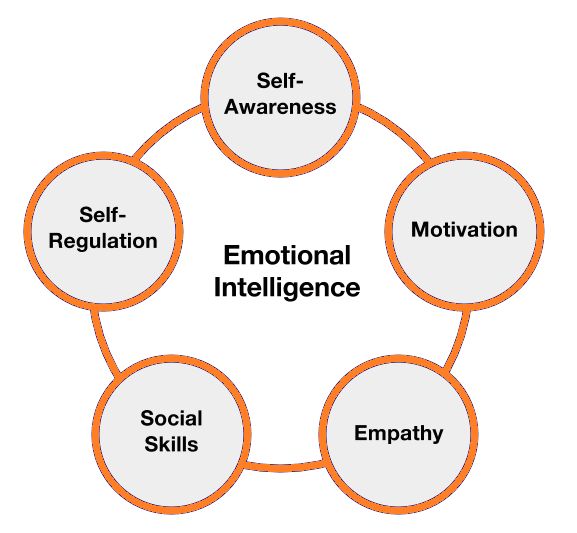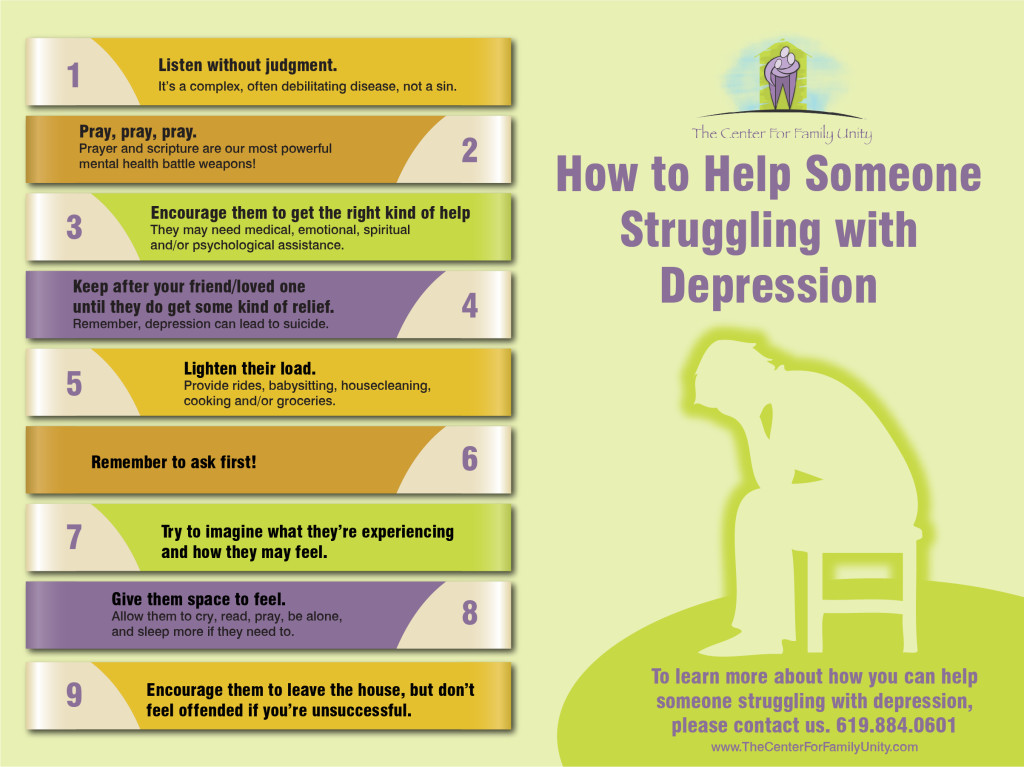Stop your child from lying
Why Kids Lie and What Parents Can Do to Stop It
Call them fibs, whoppers or straight-up untruths: However you label them, kids are likely to lie somewhere along the way. While a younger child may conjure up an elaborate tale about how she couldn’t possibly have kicked a younger sibling, older kids may flat-out lie about doing their homework.
Sometimes the onset of lying is sudden and intense, reports Matthew Rouse, PhD, a clinical psychologist. “It’s a new thing where they were pretty truthful most of the time before and then suddenly they’re lying about a lot of stuff,” he says. This, of course, is concerning to parents. But if caregivers can understand why kids lie and be prepared to deal with the issue, the truth can come out.
Why kids lie Most parents think children lie to get something they want, avoid a consequence or get out of something they don’t want to do. These are common motivations, but there are also some less obvious reasons why kids might not tell the truth — or at least the whole truth.
To test out a new behavior
Dr. Rouse says one reason children lie is because they’ve discovered this novel idea and are trying it out, just as they do with most kinds of behaviors, to see what happens. “They’ll wonder, what happens if I lie about this situation?” he says. “What will it do for me? What does it get me out of? What does it get me?’”
To enhance self-esteem and gain approval
Children who lack confidence may tell grandiose lies to make themselves seem more impressive, special or talented to inflate their self-esteem and make themselves look good in the eyes of others. Dr. Rouse recalls treating an eighth-grader who was exaggerating wildly about 80 percent of the time: “They were kind of incredible experiences that weren’t within the bounds of plausible at all.” For instance, the boy would say he’d gone to a party and everyone had started to chant for him when he came in the door.
To get the focus off themselves
Children with anxiety or depression might lie about their symptoms to get the spotlight off them, Dr. Rouse notes. Or they might minimize their issues, saying something like “No, no I slept fine last night” because they don’t want people worrying about them.
Rouse notes. Or they might minimize their issues, saying something like “No, no I slept fine last night” because they don’t want people worrying about them.
Speaking before they think
Carol Brady, PhD, a clinical psychologist and regular columnist for ADDitude magazine who works with a lot of kids with ADHD, says they may lie out of impulsivity. “One of the hallmarks of the impulsive type of ADHD is to talk before they think,” she says, “so a lot of times you’re going to get this lying issue.”
Sometimes kids can really believe they’ve done something and tell what sounds like a lie, Dr. Brady adds. “Sometimes they’ll really just forget. I have kids who say, ‘To tell you the truth, Dr. Brady, I thought I did my homework. I really thought I did. I didn’t remember I had that extra work.’” When this happens, she says, they need help supplementing their memory by using techniques such as checklists, time limits and organizers.
And then there are white lies
Just to make things even trickier, in certain situations parents might actually encourage children to tell a white lie in order to spare someone’s feelings. In this case, the white lie and when to use it fall under the umbrella of social skills.
In this case, the white lie and when to use it fall under the umbrella of social skills.
Both Dr. Rouse and Dr. Brady say it’s first important to think about the function of the lie. “When I’m doing an evaluation, there are questions on our intake forms where parents can check off whether the child lies,” Dr. Rouse says. “It’s something I might spend 20 minutes delving into. What kinds of lies, what are the circumstances of the lies?” He says behavioral treatments depend on the function of the lies and the severity of the problem. “There are no hard and fast guidelines,” he says. “Different levels mean different repercussions.”
Level 1 lie
When it comes to attention-seeking lying, Dr. Rouse says that, generally speaking, it’s best to ignore it. Rather than saying harshly, “That’s a lie. I know that didn’t happen to you,” he suggests a gentle approach where parents don’t necessarily have a consequence but they’re also not trying to feed it a lot of attention.
This is especially true if the lying is coming from place of low self-esteem. “So if they’re saying, ‘I scored 10 goals today at recess in soccer and everybody put me on their shoulders and it was amazing’ and you think it’s not true, then I would say don’t ask a bunch of follow-up questions.” For these kind of low-level lies that aren’t really hurting anyone but aren’t good behavior, ignoring and redirecting to something that you know is more factual is the way to go.
Level 2 lie
If that doesn’t work, Dr. Rouse says, parents can be more transparent about it by offering a mild reprimand. “I’ve had situations where it’s an inflated kind of fantastical type of lie,” he says. “I’ll have parents label it and call it a tall tale. If the child is telling one of these stories, a parent will gently say, ‘Hey, this sounds like a tall tale, why don’t you try again and tell me what really happened?’ ” It’s about pointing out the behavior and encouraging kids to try again.
Level 3 lie
If something is more serious, like older kids lying about where they’ve been or whether they’ve done their homework, parents can think about having a consequence. Kids should be clear that there will be repercussions for this kind of lie, so it’s not coming out of the blue. Like all consequences, Dr. Rouse recommends it should be something short-lived, not overblown, which gives the child a chance to get back to practicing better behaviors. Some examples: losing her phone for an hour or having to do a chore
Also, depending on the severity, there also has to be a component of addressing what they were lying about. If a child has said he didn’t have any homework all week and then the parent finds out he had homework every day, there needs to be some kind of consequence for the lying and he also has to sit down and do all the work. If he’s hit another child and lied about it, there’s a consequence for the lying and also for hitting. In this case, Dr. Rouse says, you would also have him write an apology letter to the other child.
Rouse says, you would also have him write an apology letter to the other child.
Let them know the truth reduces consequences
For instance, if teens have been drinking at a party, the parent will want them to call to be picked up. But kids know there also has to be a consequence for the drinking. “There’s a hard balance to strike between having the open dialogue but also setting appropriate limits when necessary,” Dr. Rouse says.
In this situation, where lying would have been easier, when parents are doling out the consequence they can also praise the child for telling the truth and tell them it makes them more trustworthy. They might also reduce the consequence, such as letting kids know they’re taking their phone away for a day instead of a week.
Dr. Rouse adds one caveat: Children and teens should not think consequences are negotiable. “Sometimes the kid will say, ‘But I told you the truth,’” he says.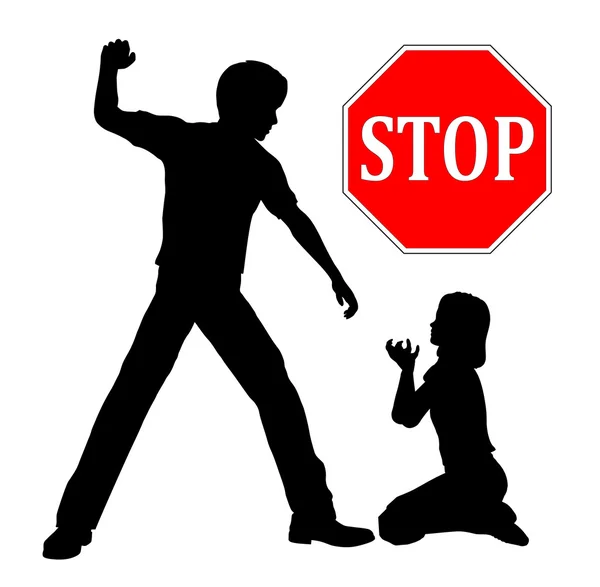 “They’ll get manipulative, saying, ‘This is just making me want to never tell the truth again.’” Parents shouldn’t give in at that point.
“They’ll get manipulative, saying, ‘This is just making me want to never tell the truth again.’” Parents shouldn’t give in at that point.
Use truth checks
Let’s say parents have been told by a teacher their child didn’t do her homework. Dr. Brady suggests that they give their kid a chance to tell the truth. If she doesn’t at first, the parents could say, “I’m going to walk away and give you 10 minutes and then I’m going to come back and ask you again. If you change your mind and want to give me a different answer, it’s just a truth check and you won’t get in trouble.”
This way, if a child gives an off-the-cuff answer because she’s scared of consequences or she doesn’t want to disappoint a parent, she has the chance to really think about whether she wants to lie or fess up without the consequences. Dr. Brady notes that this technique isn’t for a child who chronically lies.
Use the preamble method
Parents can also set up kids to tell the truth by reminding them that they don’t expect perfection, Dr. Brady notes. Parents could say, “I’m going to ask you a question and maybe you’re going to tell me something I don’t really want to hear. But remember, your behavior is not who you are. I love you no matter what, and sometimes people make mistakes. So I want you to think about giving me an honest answer.” Giving kids a chance to reflect on this may lead to them telling the truth.
Brady notes. Parents could say, “I’m going to ask you a question and maybe you’re going to tell me something I don’t really want to hear. But remember, your behavior is not who you are. I love you no matter what, and sometimes people make mistakes. So I want you to think about giving me an honest answer.” Giving kids a chance to reflect on this may lead to them telling the truth.
Give kids with ADHD more time to think
Dr. Brady says kids with ADHD, who are prone to giving impulsive answers that come out as lies, need some extra time to think things through before speaking. Impulsivity can be a problem both at home and in school, when a teacher asks if a child has finished an assignment and the child answers yes without even looking at his paper. That’s when he needs to be taught to slow down and check his work.
What parents shouldn’t doDon’t ever corner your child
Putting a child on the spot can set him up to lie.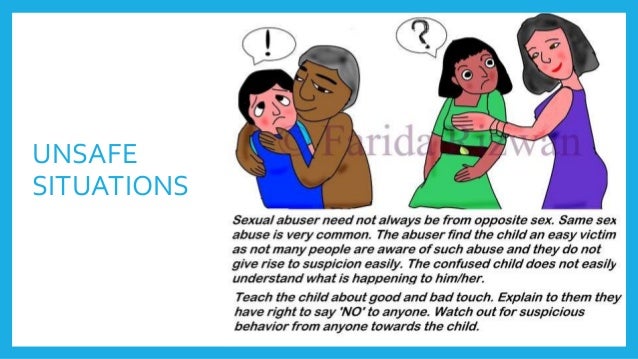 If parents know the true story, Dr. Brady recommends, they should go right to the issue and discuss it. Instead of asking a child if he didn’t do his homework a parent could just say, “I know you didn’t do it. Let’s talk about why that’s not a good idea.”
If parents know the true story, Dr. Brady recommends, they should go right to the issue and discuss it. Instead of asking a child if he didn’t do his homework a parent could just say, “I know you didn’t do it. Let’s talk about why that’s not a good idea.”
Don’t label your child a liar
It’s a big mistake to call a child a liar, Dr Brady argues. The wound it creates is bigger than dealing with what he lied about in the first place. He thinks, “Mom won’t believe me.” It makes him feel bad about himself and may set up a pattern of lying.
Video Resources for Kids
Teach your kids mental health skills with video resources from The California Healthy Minds, Thriving Kids Project.
Start Watching
How to Deal with Lying in Children and Teens
When you catch your child in a lie, it’s natural to feel betrayed, hurt, angry, and frustrated. But here’s the truth: lying is a normal child behavior problem. It needs to be addressed, but for most kids, it’s not a character flaw, and it’s not an issue of morality.
Instead, lying is the immature and ineffective way they choose to solve a problem. Rather than fix an underlying problem, your child lies about it.
If your child doesn’t complete his homework, he solves that problem by lying and telling you he did. If your child doesn’t get home before her curfew, she lies about why. Or about where she was or who she was with. Lying is used to avoid consequences rather than face them.
I believe that with kids, lying is used as a faulty problem–solving skill. And it’s our job as parents to teach our children how to solve those problems in more constructive ways. Sometimes that means addressing the lying directly, but other times it means addressing the underlying behavior that made the lie seem necessary.
In this article, I explain the various reasons why kids lie and how to handle specific lying situations.
Kids Lie To Avoid Trouble
Most often, kids lie to avoid trouble. Let’s say they’ve gotten themselves into a jam because they did something they shouldn’t have done.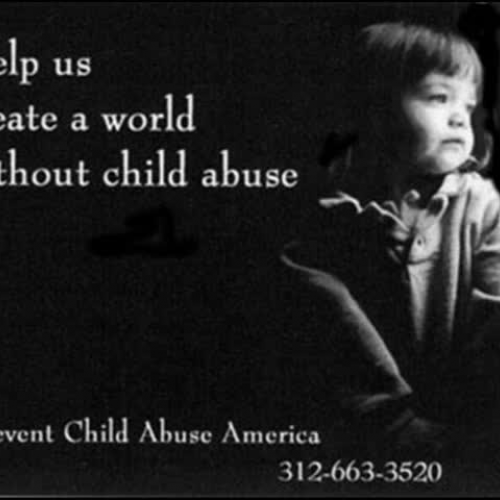 Maybe they broke a rule, or they didn’t do something they were supposed to do, like their chores. If they don’t have another way out, rather than suffer the consequences, they lie to avoid getting into trouble.
Maybe they broke a rule, or they didn’t do something they were supposed to do, like their chores. If they don’t have another way out, rather than suffer the consequences, they lie to avoid getting into trouble.
Again, in my opinion, the primary reason kids lie is that they don’t have another way of dealing with a problem or conflict. Sometimes it’s the only way they know how to solve a problem. It’s a survival skill, albeit a faulty one.
Kids Lie to Individuate From Their Parents
Sometimes kids use lying as a way to keep part of their lives separate from their parents. In psychology, we call this individuation, and it’s quite normal.
At times it may even seem that they make up needless lies about things that seem trivial. It can be baffling to parents.
And, of course, children lie when they think the house rules are too strict and they decide to disobey them.
Let’s say you have a 16–year–old who isn’t allowed to wear makeup, but all her friends are wearing it. So she wears it outside the house, then lies to you about it. Lying may become a way for her to have you believe she’s following your rules and still do typical teen activities.
So she wears it outside the house, then lies to you about it. Lying may become a way for her to have you believe she’s following your rules and still do typical teen activities.
Kids Lie To Establish Identity
Kids will use lying to establish an identity, even if that identity is false. This can be used to impress their peers, perhaps in response to peer pressure. Your child might lie to his peers about things he says he’s done (that he hasn’t) to make himself sound more impressive. This is not unusual, and we all know adults who still do this in one way or another.
Kids Lie To Get Attention
When your child is young, and the lies are inconsequential, this behavior may just be his way of getting a little attention. This is normal.
Younger children also make up stories during imaginative play. Understand that this is not lying but rather a way for them to engage their imaginations and start to make sense of the world around them.
So, when a small child says, “Mommy, I just saw Santa fly by the window,” I think it is very different from an older child who says, “I finished my homework,” when he hasn’t.
Kids Lie To Avoid Hurting Other’s Feelings
At some point, most people learn how to bend the truth in order not to hurt other people’s feelings. If someone asks you if you like their new shoes, and you don’t, you might still say, “Hey, those look great on you” instead of being completely honest.
But kids don’t have the same sophistication that adults do, so it’s often more comfortable for them to lie instead. This type of lying is a first step toward learning how to say something more carefully.
Indeed, we teach our kids to lie when we say, “Tell Grandma you like the present even if you don’t because it will hurt her feelings otherwise.”
We have a justifiable reason—we don’t want to hurt someone’s feelings who’s gone out of their way for us. Nevertheless, we are still teaching our kids how to bend the truth. And again, this is normal.
Lying in Children is Not Usually a Moral Issue
I don’t believe lying in children is a moral issue. Therefore, I think it’s imperative not to take it personally if your child lies.
Therefore, I think it’s imperative not to take it personally if your child lies.
Indeed, most kids don’t lie to hurt their parents. They lie because there’s something else going on. The important part for you as a parent is to address the behavior behind the lie. If you’re taking it personally, you’re probably angry and upset—and not dealing with the behavior that led to the lie.
Here’s an example. Let’s say your child didn’t do his homework, but he told you he did. When you find out that he’s lying and confront him, he confesses and explains that he was playing sports with friends after school, and that’s why he didn’t do his homework.
At this point, you have a choice to make as a parent. Either you can focus on the fact that your child lied to you, or you can focus on the fact that he did not complete his homework.
I strongly recommend that you focus on the underlying behavior—the homework not being completed. As your child improves the underlying behavior, the reason for lying will go away.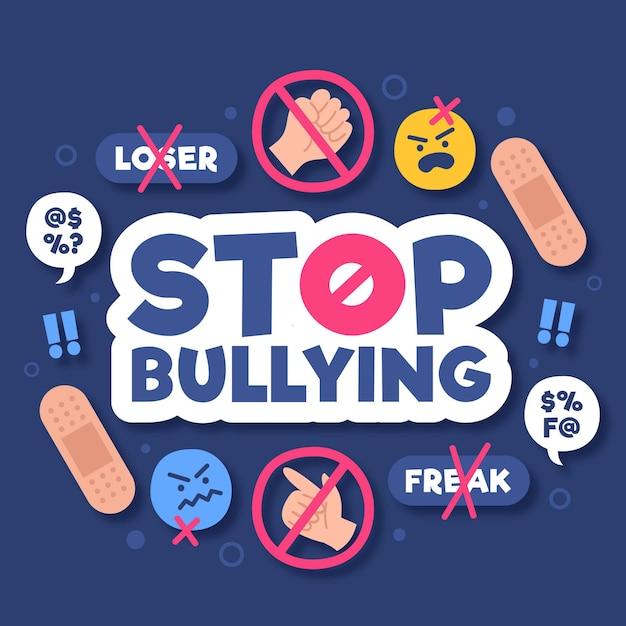 He won’t need to lie.
He won’t need to lie.
In contrast, if you yell at your child about the lying, about being betrayed, or about being disrespected, then that’s all you’re going to be able to address. Your child will shut down. And you’re not going to be able to deal with the real issue of your child ensuring that his homework is completed.
The bottom line is that your anger and frustration about the lie is not going to help your child change the behavior (not doing his homework) that made the lie necessary for him.
So lying is not strictly a moral issue; it’s a problem–solving issue. Lying is a lack of skills issue and an avoiding consequences issue. Your child isn’t lying because he is immoral; he’s lying because he can’t figure out how to get his homework done on time.
Most kids know right from wrong—that’s why they’re lying in the first place. They don’t want to get in trouble for what they’ve done, and they’re using lying to solve their problems.
That means our kids need better problem-solving skills, and you can respond as a parent by helping them work on their ability to problem-solve, which can be accomplished with effective consequences that teach your child how to problem-solve.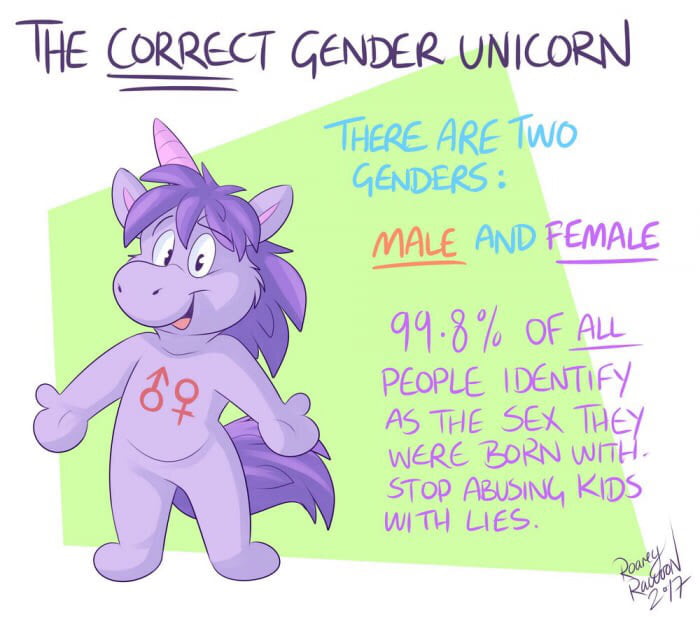
Pick Your Battles: Focus on the Serious Lies
I believe it’s the parent’s job to determine which lies are serious and which are not. And the most serious lies pertain to unsafe, illegal, or risky behavior. Therefore, I recommend that you pick your battles and focus on the serious lies.
For example, you may hear your child say to another child, “Oh, I like that dress,” and then later on in the car, they tell you, “I didn’t like that dress.” You might decide to confront your child about this contradiction. But you might also let it go, especially if this happens only occasionally.
But if they’re lying about something risky or illegal or unsafe, you must address it. And if it’s about risky sexual behavior, drugs, or other harmful activities—you may need to seek some help from a professional.
So pick your battles. Focus on what’s important.
What to Do If You Catch Your Child in a Lie
If you catch your child in a serious lie, I recommend that you do not react immediately. Instead, send him to his room so you can calm down. Talk with your spouse or a trusted friend or family member and come up with a game plan. Allow yourself time to think about how to handle the situation.
Instead, send him to his room so you can calm down. Talk with your spouse or a trusted friend or family member and come up with a game plan. Allow yourself time to think about how to handle the situation.
Remember, when you respond without thinking, you’re not going to be effective. So give yourself a little time to plan this out.
When you do talk, don’t argue with your child about the lie. Just state what you saw, and what is obvious. You may not know the reason for the lie, but eventually, your child might fill you in on it. Again, simply state the behaviors that you saw.
The conversation might go something like this:
“I got a call from our neighbor. She saw you sneaking out of your window. And I noticed that you were falling asleep at the kitchen table this morning at breakfast. But you told us that you were home all night.”
And then say to your teen:
“There’s going to be a consequence for that. You’re not going to be able to stay over at your friend’s house next weekend. And we’re concerned about where you went.”
And we’re concerned about where you went.”
Leave the door open for him to tell you what happened.
Remember, state what you believe based on the facts you have. Do it without arguing; just say it matter–of–factly.
“We have this information, we believe it to be true, and these are the consequences.”
Keep it very simple and listen to what your child has to say, but be firm.
How to Address Chronic Lying: Stage a Lying Intervention
If your child lies chronically or lies about unsafe, risky, or unhealthy behavior, I think it makes sense to address the actual lying in addition to the underlying behavior. You can do this by staging a lying intervention.
A lying intervention is a planned and structured conversation about lying behavior. This conversation lets your child know what you’ve been seeing, and it gives you a chance to tell them that you are concerned.
Here are some things to keep in mind when staging an intervention.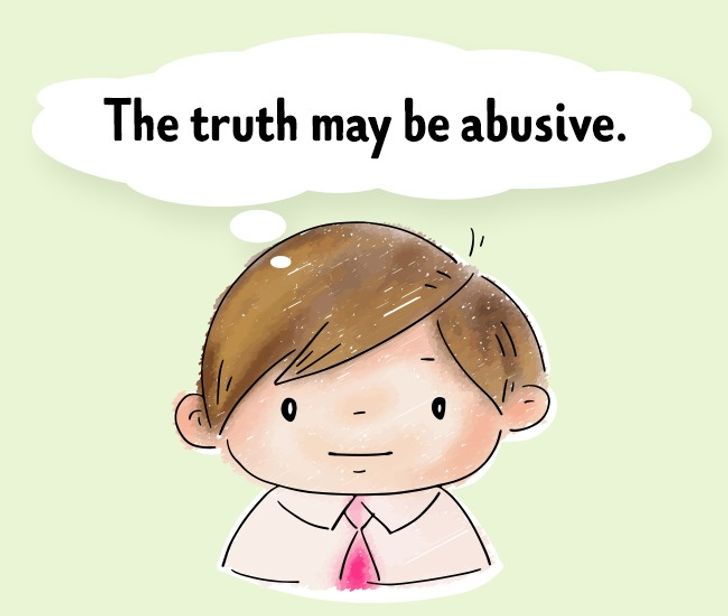
Plan the Intervention in Advance
Think about how you’re going to intervene in advance. Plan it with your spouse or co-parent. If you’re single, ask another close adult family member to be there with you.
When this issue came up with our son, my husband James and I planned out what we were going to say, how we were going to react, and even where we were going to sit.
We decided we were going to be as neutral and unemotional as possible. We identified the problem behaviors we wanted to address. We also decided what would be the consequences for our son’s behavior.
We did all of this ahead of time.
Be Specific About the Lying Behavior
When you’re talking with your child, be specific about what you saw and what the problems are. State your intentions calmly and matter-of-factly:
“If the lying about homework continues, this will be the consequence.”
“It’s obvious you snuck out last night. There will be a consequence for that behavior.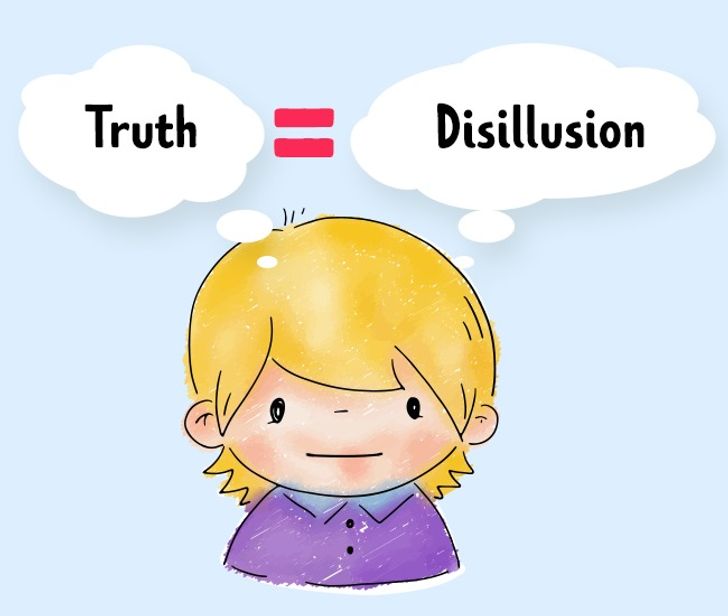 ”
”
Remember, it has to be a consequence that you can and will follow through with.
Keep the Intervention’s Message Simple
Keep it very focused and simple for your child. Concentrate on the behavior. And then tell him that you want to hear what was happening that made him feel he needed to lie.
Understand that you are not looking for an excuse for the lie, but rather to identify the problem your child was having that they used lying to solve.
Be direct and specific. The intervention itself should be quick and to–the–point. Don’t lecture your child for a long time. Remember that lecturing is not going to be helpful. Kids just tune that out. They’ve heard it over and over. They stop listening, and nothing changes. Lecturing is ineffective.
Take Time to Listen to Your Child
Because lying is most likely the way your child is trying to problem-solve, make sure you indicate that you want to hear what’s going on with her. Allow your child to explain herself and be prepared just to listen.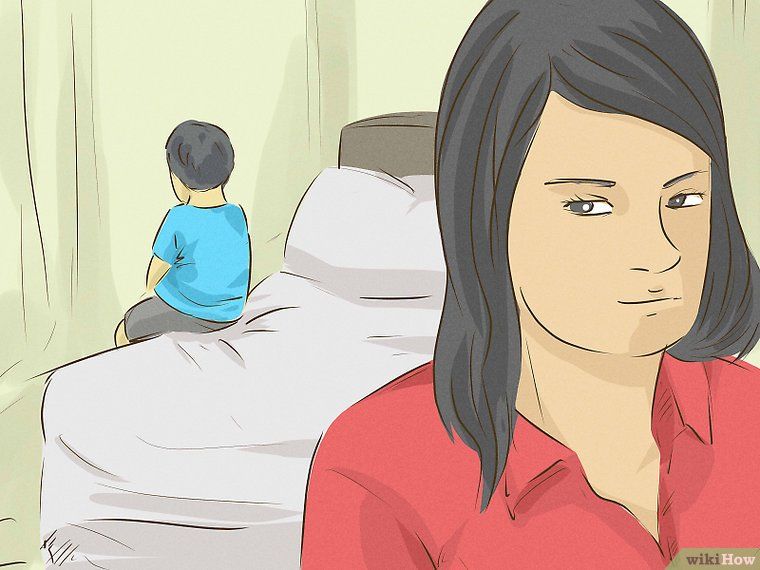
She may not be ready to talk with you about it initially. Therefore, just be open to hearing what your child’s problem is. You want to create a safe environment for her to open up to you.
But if your child is not ready, don’t push her. Instead, simply reiterate that you are willing to listen whenever she wants to talk. Try to be patient.
Related content: How to Talk to Your Child About Lying
A Word about Magical Thinking
Be aware that kids and adolescents are prone to engage in what psychologists call magical thinking. Your child engages in magical thinking when he convinces himself that his lies are true. Understand that your child doesn’t want to believe he’s a liar. No one wants to be known as a liar.
So you’ll see kids who’ve gotten caught smoking at school say, “No, I wasn’t smoking”—even though the smoke is still in the air. That’s magical thinking.
And when you’re a kid, you think that if you keep repeating the same thing over and over again, it will magically be true.
Moreover, if your child gets away with a few lies, he will start thinking he should be able to get away with them the next time. The lies become more and more abundant—and absurd.
But it’s your job as a parent to say in a matter–of–fact way what you feel is the truth. Acknowledge the lie, but give the consequence for the behavior, not for the lie.
Conclusion
Realize that most kids are not going to lie forever. In all my years in working with adolescents, there were very, very few kids that I met who lied chronically for no reason. Usually, kids don’t lie arbitrarily; they have a reason for doing so, no matter how wrong that reason might be. Your child does know right from wrong, but sometimes he chooses to lie.
I understand that it’s hard not to take lying personally or to be disappointed when your child lies. But just remember, your child is trying to solve a problem ineffectively. Our job is to teach them appropriate and effective ways to solve problems and to coach them through these confusing years.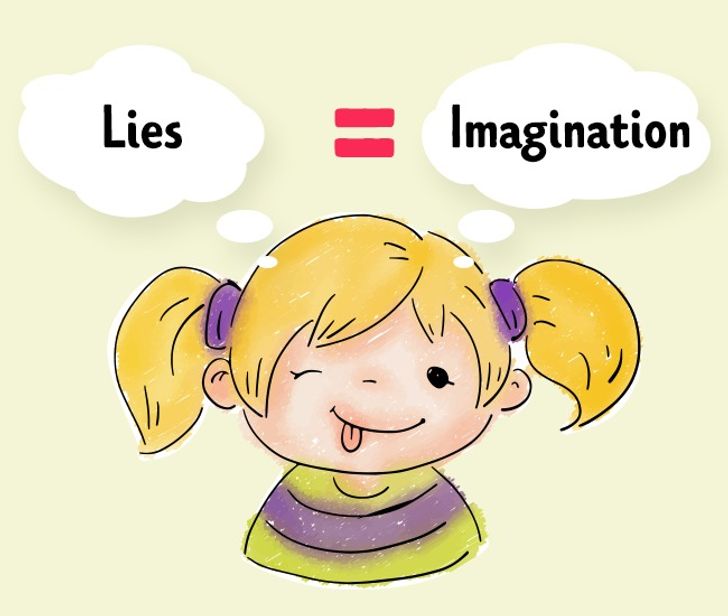 Over time, they can learn to do that without lying.
Over time, they can learn to do that without lying.
If a child is lying - Journal of the children's development center "Constellation"
Many parents of preschool children have caught their child in a lie at least once. How to distinguish an innocent fantasy from a deliberate lie? Why is the child lying? How to behave in such a situation? We want to discuss these important questions today.
How to understand that a child is lying?
Preschool children are pretty good actors and manipulators. However, according to some signs, we can still understand whether the baby is telling the truth or lying. Most likely, if the child is trying to hide something, he does not look into your eyes. Unconsciously, he can pull his hair, his ear, hide his hands in his pockets, scratch his nose, put his hands in his mouth, etc. In other words, when a child lies, traits unusual for him appear in his behavior and facial expressions. nine0003
Be attentive to your baby.
You may notice signs of lying that are specific to your child. If you are not sure that the baby is telling a lie, do not take hasty measures.
Why does the child lie?
In fact, preschool children often lie unconsciously. At this age, the child's imagination is highly developed, fantasies are often confused with reality. The kid may not even notice that he is telling a lie. In addition, young children who do not yet have enough social experience do not understand that lying is not good. nine0003
It is important to determine whether the baby understands that he is lying: whether the lie is unconscious or, on the contrary, has some purpose.
So, if the lie is not directly related to the child's fantasy, most likely it can be seen as a signal of a problem. In this case, various motives for such behavior of the baby can be distinguished. Here are the most common reasons for lying in childhood:
- Self-defense.
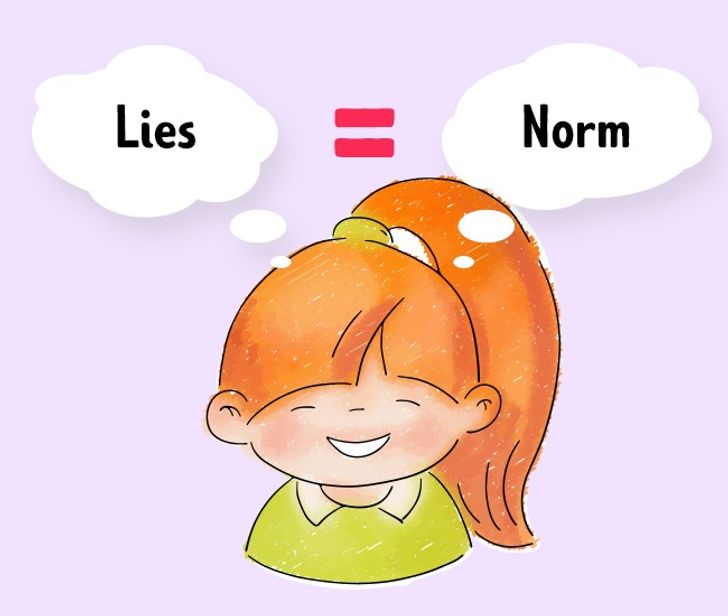 The child may try to avoid punishment or ridicule in this way. Moreover, the more prohibitions in the family in relation to the baby, the more often he will try to get around them, including with the help of lies. nine0026
The child may try to avoid punishment or ridicule in this way. Moreover, the more prohibitions in the family in relation to the baby, the more often he will try to get around them, including with the help of lies. nine0026 - Experiment. If the baby does not know how you will react to a lie, he may want to understand what will happen if he deceives you.
- Desire to attract attention. Unfortunately, this is one of the most common reasons for lying in preschoolers. If a child does not receive attention, he is forced to seek it with the help of lies and deceit.
- Manipulation. With the help of deception, the kid tries to get what he wants.
The kid lies because he is afraid to tell the truth
Very often, the reason for lying in preschoolers is fear. The child lies because he is afraid that he will be punished, ridiculed, humiliated, afraid to seem weak, to disappoint loved ones. However, this fear is a sign of a deeper psychological problem - the baby does not feel safe.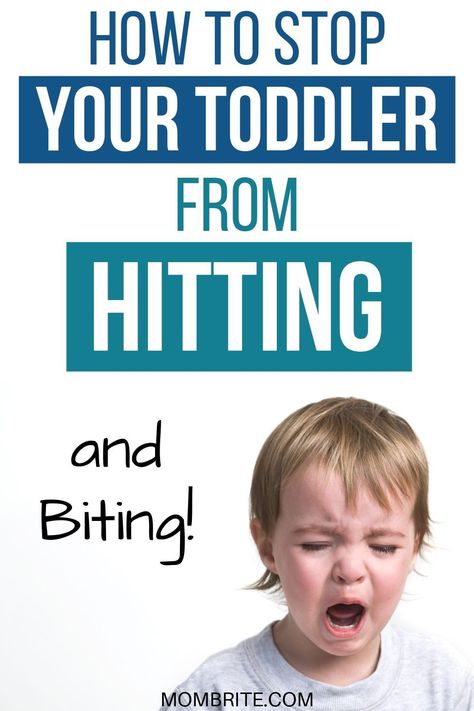 In a fit of anger, many parents use phrases such as “if you behave like this, I will stop loving you”, “good children don’t do that”, “Katya helps her mother, and you ...”. Such statements undermine the baby's trust in you, and make the child feel rejected and helpless. The instinct of self-preservation tells the child that in case of fault it is better to lie, then the mother will not stop loving. Children who know they will be listened to and accepted don't need to lie. nine0003
In a fit of anger, many parents use phrases such as “if you behave like this, I will stop loving you”, “good children don’t do that”, “Katya helps her mother, and you ...”. Such statements undermine the baby's trust in you, and make the child feel rejected and helpless. The instinct of self-preservation tells the child that in case of fault it is better to lie, then the mother will not stop loving. Children who know they will be listened to and accepted don't need to lie. nine0003
It is important to create an atmosphere of acceptance and psychological comfort in the family. Do not punish your child over trifles, talk more about how much you appreciate him, and never threaten the baby by questioning your unconditional love for him.
A bad example is contagious
A preschooler can learn to lie by watching adults and peers. Seeing that someone's lies lead to the achievement of the desired goal, the baby adopts this behavior model. Remember that children imitate adults, so try to watch your behavior and not lie, especially in the presence of a child. nine0003
nine0003
Lying as a way to increase self-esteem
Preschool children tend to exaggerate and embellish everything. Sometimes this also applies to the personality of the child himself. For example, a kid tells everyone that he has superpowers, invents stories about his family and home, assures others of his uniqueness. Most likely, the reason for this is the low self-esteem of the child. In this case, you need to be very careful about his feelings and try to understand what caused such an attitude towards yourself. For more information on how to behave if a child is lying, see the video. nine0003
What should I do if my child is lying?
In order for a child to understand that lying is not an option, it is important to correctly respond to his words.
-
Be calm, try to cope with negative emotions.
 If you caught the kid in a lie, do not make a scandal, but calmly tell the child about it. Stay alone with him and discuss the situation. The child must feel that his offense will not make you doubt him. nine0065
If you caught the kid in a lie, do not make a scandal, but calmly tell the child about it. Stay alone with him and discuss the situation. The child must feel that his offense will not make you doubt him. nine0065 - Do not interrogate. This will only aggravate the situation and force the child to “close”.
- State your position clearly. Give a negative assessment of the act, but not the personality of the child. Phrases such as “I get upset when I find out that someone is lying to me” or “I feel bad that I did not find out the truth” will do. nine0026
- If you guess the reason for the lie, gently indicate it ("probably you did not want to upset me", "I understand, you want me to pay more attention to you"). Watch the child's reaction.
- Explain to the child that if he confesses what he did, you will not stop loving him.
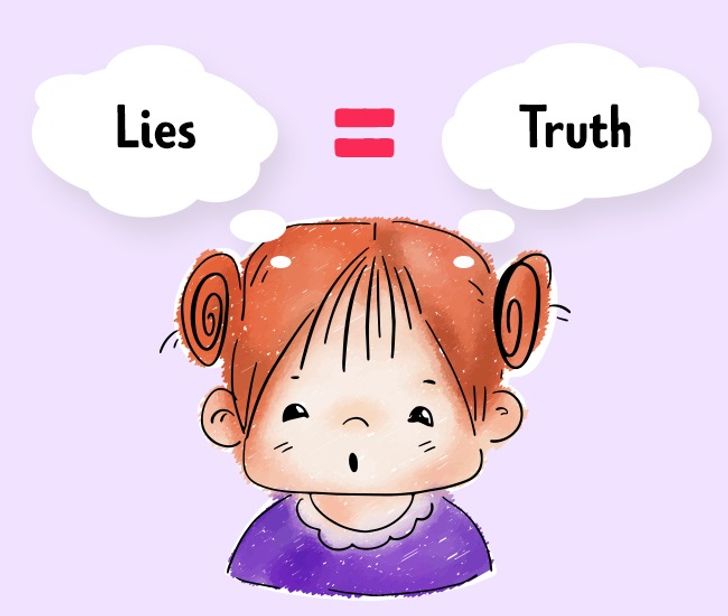 Praise him for his honesty and don't be afraid to admit your mistakes to your child. In order for a child to learn to be honest, the right example must be in front of his eyes.
Praise him for his honesty and don't be afraid to admit your mistakes to your child. In order for a child to learn to be honest, the right example must be in front of his eyes. - Testing a new behavior model.
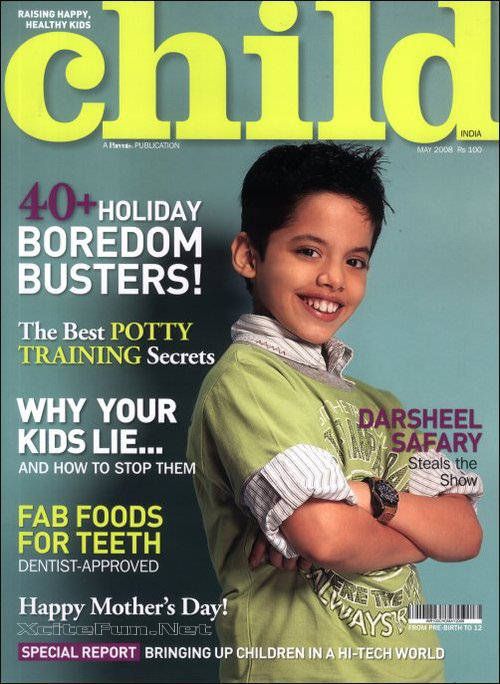 At a certain age, children receive information that there is a lie and they need to test this behavior. This happens with every new behavior or way of communication that children come across - they check how this way is convenient, effective and what results it gives. Once is not enough, because it is necessary to determine what lies will save from, what advantages it will give, in what situations and with what people.
At a certain age, children receive information that there is a lie and they need to test this behavior. This happens with every new behavior or way of communication that children come across - they check how this way is convenient, effective and what results it gives. Once is not enough, because it is necessary to determine what lies will save from, what advantages it will give, in what situations and with what people. - Children with Attention Deficit Hyperactivity Disorder (ADHD) may lie unintentionally because the language function is faster than the mental analysis of what has been said. Lies in such children are often manifested and are not associated with a character trait or a desire to hide or embellish something, but with impulsiveness. nine0026
- Lying as a social skill can be taught by parents. This often happens when parents ask a child to tell a lie so as not to aggravate difficult situations or cause anxiety to other people. If such impulses are correctly presented and used by the child correctly, then this type of lie can be attributed to social.
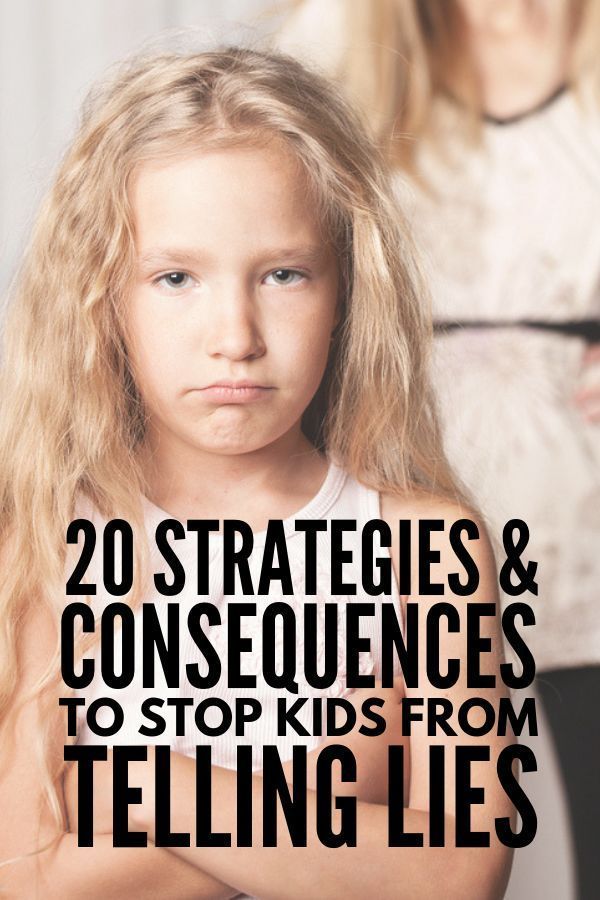
- At a certain age, the ability to distinguish between fantasy and reality is practically absent. Children of preschool and primary school age believe that if wishful thinking is true, then it will be so, fantasies will turn into reality, and voiced desires will come true. This type of lie can be assessed as a manifestation of the true desires of the child. Even if he claims that he did not do something, this indicates that he wants such an action not to take place and is trying to change reality with words. nine0026
- Raising self-esteem and gaining the approval of others is very important for children. Therefore, they may invent various facts about themselves just to look better or get praise. As soon as the child receives enough attention and care, such lies disappear.
- Construction of reality is a kind of protective mechanism of the psyche. It is typical for children who grow up in difficult conditions of boarding schools, families where there is violence, toxic relationships, high levels of toxicity, beatings and insults.
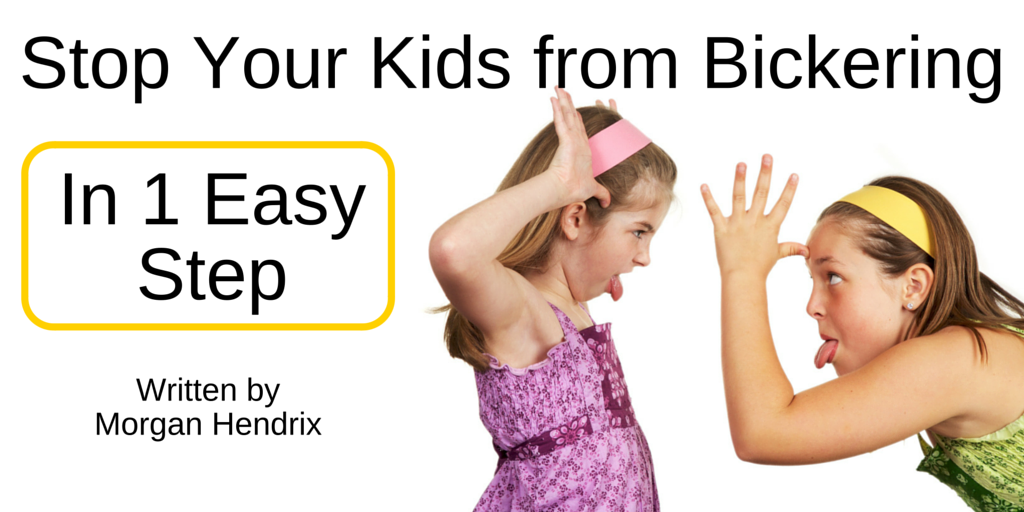 In order to at least slightly protect their own psyche from the destructive effects of the surrounding reality, the child is completely immersed in a fictional world, where everything is fine or exactly much better than it actually is. At some stage, such a fictional world is presented to everyone around as real. nine0026
In order to at least slightly protect their own psyche from the destructive effects of the surrounding reality, the child is completely immersed in a fictional world, where everything is fine or exactly much better than it actually is. At some stage, such a fictional world is presented to everyone around as real. nine0026 - There is no need to corner the child with a lot of leading questions if the parent already knows the truth.
 The more pressure there is, the more likely it is that the child will vomit even more to avoid punishment, turning a small lie into a huge fantasy narrative. It is recommended instead to directly state that the lies are known and openly discuss the issue.
The more pressure there is, the more likely it is that the child will vomit even more to avoid punishment, turning a small lie into a huge fantasy narrative. It is recommended instead to directly state that the lies are known and openly discuss the issue. - No need to label the child, call him a liar or a liar, say that trust has been completely destroyed. This can lead to the fact that children stop telling their parents anything at all, even sharing problems. Only one act should be discussed and it should be said that the lie is negative, not the child. nine0026
- It is necessary to determine for what purpose the child uses deception and, depending on this, solve the problem.
- If a child is lying to get attention, then this fact should be ignored altogether. One should not punish or expose, but also one should not pay positive attention to what was said. When the lie is aimed at increasing self-esteem, does not harm anyone, then it should simply be skipped and the conversation redirected in another direction. At the same time, it is necessary to solve the general problem with the self-esteem and confidence of the child, the amount of your attention in his direction. nine0026
- Repeated lies already require correction, but in a mild form.
 If parents hear that the story sounds implausible, then it is necessary to voice the child that the way he presents the information sounds fantastic (like a fable, like a fairy tale, implausible) and offer to tell the same thing, but as it really was. Thus, there is a gentle indication of a lie and a simultaneous encouragement to correct everything.
If parents hear that the story sounds implausible, then it is necessary to voice the child that the way he presents the information sounds fantastic (like a fable, like a fairy tale, implausible) and offer to tell the same thing, but as it really was. Thus, there is a gentle indication of a lie and a simultaneous encouragement to correct everything. - Lies about meaningful things, such as pastime, location, tasks done, things taken, etc. requires a response. These can be various punishments that should correspond to the misconduct, were not long in time and gave the child the opportunity to correct the situation. This can be deprivation of games or a phone for several hours, assignment of homework, etc. It is important to consider that punishments should not only be for lying, but also additionally introduce elements of correcting a negative act - if the lessons were not done, then the child is obliged to do them, if he beat someone at school, then he must apologize to him and bring a present etc.
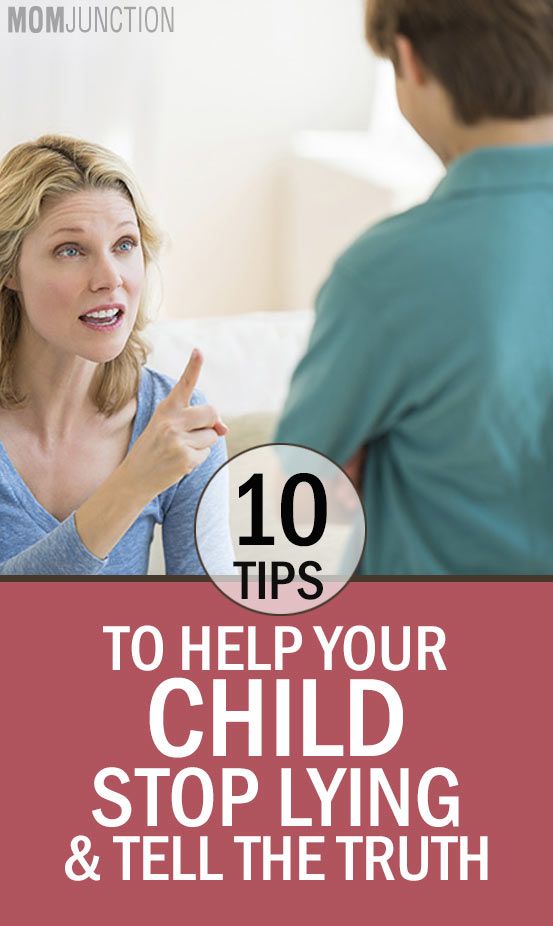
Only an adult is able to break the vicious circle of lies. Remember that a lie is a request for help and support, not a punishment.
Pins
Preschool is a period when a child's imagination is actively developing. The kid can transfer his inventions to real life, fantasizing about himself, loved ones and events that impressed him. In these cases, the child's lies are innocent. However, sometimes the baby lies deliberately. There are many reasons for this, but one thing unites them - a lack of love and acceptance. If you are faced with the fact that the child is lying, think about whether he receives enough attention, whether he feels deprived, whether his interests are taken into account, whether he is often punished. Try to create an atmosphere of psychological safety in the family in which the child could share his feelings and experiences without fear of being rejected. Then he will not have the desire to lie. nine0003
Conclusion
Sometimes it's not easy to understand why a child is lying. Behind external well-being, deep unresolved problems or grievances can be hidden that prevent the baby from fully opening up. In this case, it is better to seek help from a specialist. In the Montessori Center "Constellation" you can get a consultation from a psychologist who will give answers to all your questions and help you cope with difficulties. Watching happiness on the faces of children and their parents is a reward for us! nine0003
Behind external well-being, deep unresolved problems or grievances can be hidden that prevent the baby from fully opening up. In this case, it is better to seek help from a specialist. In the Montessori Center "Constellation" you can get a consultation from a psychologist who will give answers to all your questions and help you cope with difficulties. Watching happiness on the faces of children and their parents is a reward for us! nine0003
Article prepared by psychologist
Safonova Maria
Children's lies - Children's Medical Center of Neurology and Pediatrics on Andropova 13/32 (m. Kolomenskaya)
Children's lies is a very common problem with which parents can seek advice from specialists or ask for advice from friends. Depending on the reasons that caused the child to lie, it is necessary to build a behavior strategy that corrects such behavior.
Causes
The main causes of children's lies are as follows:
- To avoid trouble. These can be punishments, events where children do not want to attend, or communication in which they do not want to participate.
These can be punishments, events where children do not want to attend, or communication in which they do not want to participate.
- Getting what you want. In this situation, a lie acts as a way to achieve one's goals, for example, when a condition was set (“you will go for a walk after you learn your lessons”).
- Embellish your own personality, put yourself in a more favorable light. This can be showing off talents that are not there or positioning yourself as a person who does not have flaws. nine0003
These are the most common reasons not only for children's lies, but for lies in general - the motives and ways of creating the reality that suits are clearly visible. Adults lie for the same reasons, and these are deliberate, purposeful lies.
However, childhood is characterized by a lie that has no selfish purpose and is a feature of the formation of mental processes. So, a lie in childhood can be due to the following points:
The problems of children's lies must be solved, starting from what served as the main cause. In some situations, it is enough to wait until the child goes through the stage of acquaintance with a new variant of behavior, in others, a change in education and consultation with a specialist will be required.
What not to do if the child is lying
If the parents caught the child in a lie or simply his stories sound like fiction, some reactions of adults can lead to the fact that the child will become isolated, begin to lie even more or stop trusting. To prevent this from happening, you need to avoid some common behaviors:
You should never punish a child for lying without thinking why he does it. Deception arose evolutionarily and is an adaptive mechanism that allows you to survive. If a person is not afraid of anything and can get what he needs, he does not use lies, except in cases of mental disorders, when this is a symptom. In a situation where it is not possible to independently identify the causes of a lie, it is better to first seek the advice of a specialist and only then plan a conversation with the child or a system of education and punishment.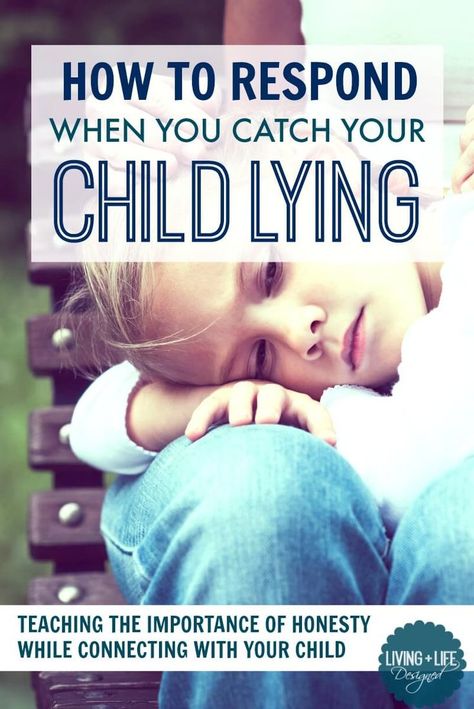 nine0003
nine0003
Recommendations for parents
Consultation for parents who are concerned about children's lies, comes down to finding individual causes of a child's lies, as well as developing individual recommendations for correction. General recommendations are as follows:







